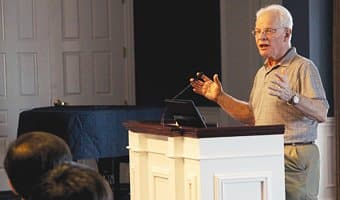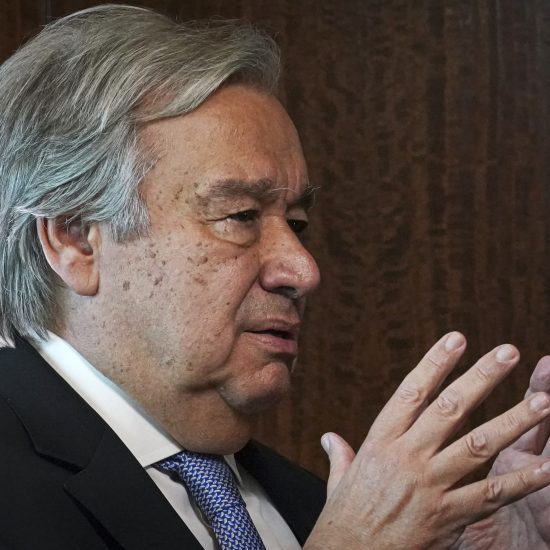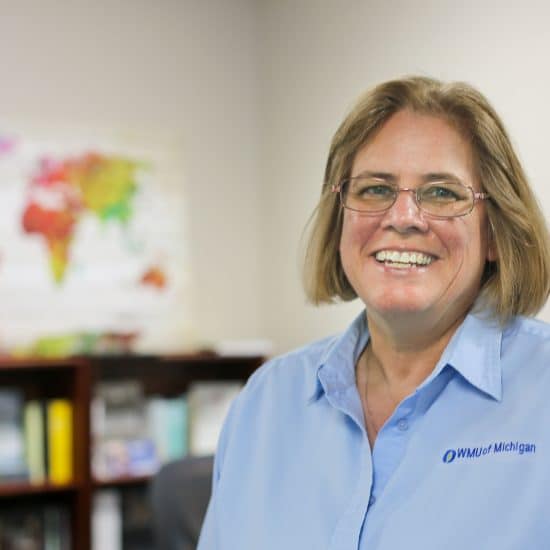Missions in the 21st century demands multicultural partnership, global missions researcher and author Patrick Johnstone insists. And pastors of some churches filled with first-generation immigrants agree.

Global missions researcher and author Patrick Johnstone told a group at Dallas Baptist University missions in the new millennium requires multicultural partnerships.
|
"Like it or not, we have a multicultural missions force that must learn to work together," Johnstone, author of six editions of Operation World, a global missions prayer guide, and The Future of the Global Church, told a recent gathering at Dallas Baptist University.
Evangelical growth in Asia, Latin America and Africa and decline in Europe mean former mission fields are becoming missions-sending forces, while historic bases of missions-sending activity need evangelization.
So, on a mission field in Europe, missionaries from the United States might find themselves working alongside missionaries from South Korea and Brazil.
A missions approach that represents only one ethnic, linguistic and cultural group often ends up exporting that culture and imposing it on other people groups, said Johnstone, missions researcher for WEC International, formerly World Evangelization Crusade.
A genuinely multicultural missions team that includes representatives of various racial and ethnic groups will face challenges in interpersonal relations and decision-making approaches, he noted. But while multicultural missions may require more effort and be less efficient in the short term, its benefits outweigh its drawbacks, Johnstone insisted. "The work is slower, but the results are better."
John Nguyen, pastor of Vietnamese Baptist Church in Garland, believes in the importance of cross-cultural missions experiences—both locally and globally.
Nguyen, president of the http://www.daihoibaptit.org/National Vietnamese Baptist Fellowship and the Vietnamese Baptist Fellowship of Texas, serves on the Baptist General Convention of Texas Executive Board and on the governing board for Intercultural Strategic Partners, a BGCT-related program that provides seed money for international, indigenous missions projects.
"I hope every Baptist church has some mission trips outside the United States. When people get outside the country, they see things differently. And I would like to see Anglo churches partnering with ethnic-language churches," he said.
Beyond the matter of including representatives from varied ethnic groups in a multichurch mission team, churches in the 21st century also need to examine their own cultural composition. Modern-day Christians should learn from the New Testament example, Johnstone said.
"The church at Antioch was multicultural," he said, pointing to the church in northern Syria described in Acts 11:19-26.
Nguyen hopes his church eventually will become truly multicultural. The church already has employed an Anglo pastor to serve its English-speaking service that draws second- and third-generation Vietnamese. The congregation also includes members from other ethnic groups—Filipino, Anglo and South American—and Nguyen hopes their numbers increase.
Asian Indian Baptist Fellowship in Carroll-ton long has drawn members from multiple language and ethnic groups within India. But in recent years, it also has included worshippers from Chad, Taiwan and the Ukraine, Pastor Sanjay Purushotham said.
"Over time, God has broadened our vision," he said. "What an exciting thing it is when the church begins reflecting the diversity of the world."
Purushotham delights in the increased advantages a truly multicultural church enjoys in terms of fulfilling Christ's Great Commission to make disciples of all nations and the Great Commandment—love for one's neighbor.
Furthermore, a multicultural, multiracial church more closely resembles the global body of Christ, and its members benefit from exposure to people from different backgrounds, he added.
"If we are segregated, there is no opportunity to learn from each other and appreciate each other," he said.
Patty Lane, director of intercultural ministries with the BGCT, agreed. Everyone involved benefits from multicultural missions experiences and intercultural relationships, she said.
In her 2002 book, A Beginner's Guide to Crossing Cultures, Lane wrote: "Observing with our differing cultural perspectives is like looking out of a ship's porthole. What is seen from one porthole, while accurate, is not the entire view. We need to be in conversation with our fellow shipmates to get a fuller picture."



